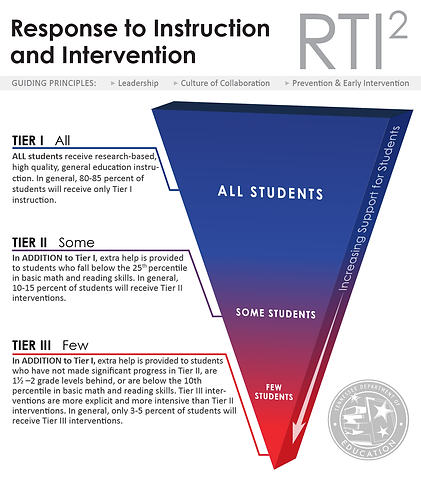Cumberland County
Special Education Department
Phone: (931) 484-3301 Fax: (931) 456-5898
2
Response to Intervention
RTI Coordinators
Brown - Mary DeRossett
CCHS - Carrie Pennington
Crab Orchard - Natalie Roberts
Homestead - Ashlee Ritzko
Martin - Sherry Chappell
North Cumberland - Lisa Smith
Phoenix - Marcy Harelson
Pleasant Hill - Susie Stewart
Pine View - Leslie Eldridge
SMHS - Josette Schlafer
South Cumberland - Vicki Mackzum
Stone - Michelle Wilson

What is RTI ?
2
A key component of RTI is that all children receive high quality curriculum and instruction in the general education classroom (Tier I).
Another component of RTI is that the school conducts universal screenings three times per school year. Universal screenings review the performance and progress of all students through brief assessments. Universal screenings help schools identify students who may need more support or other types of instruction. STAR Reading, STAR Math, and STAR Early Literacy are the universal testing tools used by Cumberland County.
As a result of the universal screenings, students may be identified as needing targeted interventions (Tier II) in addition to the high quality instruction they are receiving in TIER I. Research based interventions are used to support students in the area(s) in which they are struggling. Research based interventions are teaching strategies or methods that have been proven effective in helping children learn.
Another key component of RTI is progress monitoring. Progress monitoring is a way to assess how children are doing on a specific skill. It shows the progress of the students skills. It includes formal and informal assessments. Progress monitoring helps determine whether an intervention is successful or needs to be changed. This information is shared with parents on a regular basis through progress reports.
When progress monitoring indicates that the intervention is no longer needed, the child continues to receive support from the general education curriculum (Tier I). When progress monitoring shows that a child is not responding to the intervention, another approach or intervention may be tried. If a higher level of support is needed, students may be given more intense intervention that further focuses on the supporting skills they need to be successful learners (Tier III). Students who do not respond to Tier III interventions may be referred for special education.
2
2
2
2

